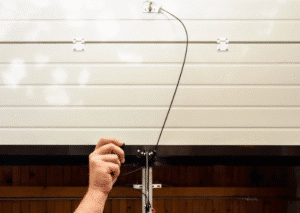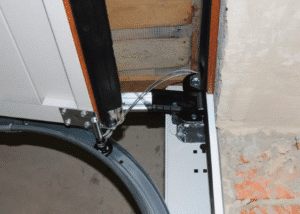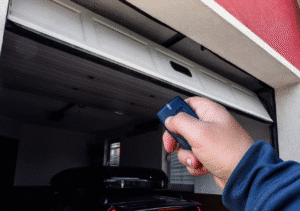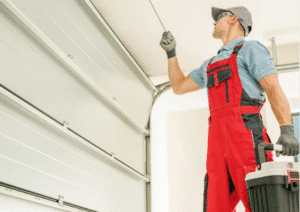Are you wondering how to fix a garage door that won’t close all the way? This complete guide breaks down the causes and offers solutions that actually work.
A garage door that won’t close all the way poses more than just a daily hassle, it can compromise your home’s safety and energy efficiency. If you’ve found yourself asking, How do you fix a garage door that won’t close all the way? You’re not alone. This common issue affects countless homeowners every year.

Tarrant County Door and Gate is here to help when you’re ready for a dependable solution. Their experienced team understands how to fix a garage door that won’t close all the way and can quickly identify the root cause. From misaligned sensors to damaged tracks, they deliver professional repairs you can trust.
Common Reasons Why Garage Doors Won’t Close All the Way
Understanding the root of the problem is the first step in resolving it. Here are some of the most common reasons your garage door might not be closing fully:
Obstructed Sensors
Garage doors rely on safety sensors to detect objects in the door’s path. If these sensors are dirty, misaligned, or blocked by debris, the door will refuse to close for safety reasons. Even a spiderweb can interfere with the infrared signal.
Track Issues or Physical Obstructions
Over time, the metal tracks that guide your garage door can become bent, dented, or obstructed by debris. If the rollers can’t move freely along the track, the door may stop short or reverse unexpectedly.
Damaged Springs or Cables

Torsion springs and lift cables do the heavy lifting. The door might struggle to move or close entirely if broken or worn out. These components are highly tense and should never be handled without professional help.
Limit Settings on the Opener
Garage door openers include limit switches that control how far the door travels when opening or closing. If these are set incorrectly, the opener might think the floor has been reached when it hasn’t, causing the door to stop early.
Cold Weather and Contraction
In colder months, metal components can contract and sensors may become fogged or frozen. Weather-related issues can temporarily affect the operation of your garage door.
Wiring or Remote Signal Problems
If your garage door only responds intermittently or stops mid-close, the issue might stem from faulty wiring, interference, or a malfunctioning remote control.
Step-by-Step Troubleshooting for Homeowners
1. Inspect the Safety Sensors
Start by locating the photo-eye sensors on either side of the garage door frame near the floor. Check for dirt, cobwebs, or physical misalignment. Use a soft cloth to clean the lens, and ensure both sensors face each other directly with steady indicator lights. Test the door afterward.
2. Clear Tracks and Check for Obstructions
Examine the metal tracks on both sides of the door for anything impeding movement. Look for rocks, leaves, or bent sections. Gently clean the tracks and remove blockages using a damp rag. Avoid using tools that could damage the track alignment.
3. Examine Springs and Cables (But Don’t Touch)
Inspect the torsion springs above the door and the cables running along the sides. Call a professional if you notice slack, fraying, or a loud snapping noise when operating the door. Tarrant County Door and Gate has the tools and training to handle spring repairs safely.
4. Adjust the Close Limit Switch
Most garage door openers have a close-limit adjustment screw on the motor housing. If your door stops short, this setting may need a slight increase. Use a flathead screwdriver to turn the screw clockwise by small increments, then test the door after each adjustment.
5. Test the Remote and Wall Button

If your door works fine with the wall-mounted button but not the remote, try replacing the remote battery. Also, check for signal interference from nearby electronics. Some openers may require a system reset. Refer to your user manual or contact Tarrant County Door and Gate for help.
When to Call the Experts at Tarrant County Door and Gate
While some issues are easy to handle, others require professional attention. Here are signs you shouldn’t go it alone:
Broken Springs or Loose Cables
A sudden drop, uneven movement, or a stuck up-and-over door often points to a broken spring or loose cable. These parts are essential for balance and safety, and they wear out over time.
Repeated Sensor Malfunctions
If your garage door keeps reversing or won’t close, misaligned or dirty sensors may be to blame. These safety components are sensitive and should always show clear alignment with no obstructions or blinking lights.
Grinding Noises During Operation
Loud grinding, squeaking, or scraping sounds could mean worn rollers, bent tracks, or lack of lubrication. Ignoring these noises can lead to bigger mechanical failures and potentially dangerous door movement if left unchecked.
Door Slamming Shut or Reversing Mid-Close
A door that slams shut or suddenly reverses mid-close is often a sign of faulty limit settings or failing components. This issue poses a safety risk and needs professional inspection right away.
Failure to Respond to Troubleshooting
If you’ve tried manual resets, cleared debris, and checked power sources but the door still won’t operate, the issue may be electrical or structural. It’s time to call in a trusted garage door expert.
Tarrant County Door and Gate provides expert inspection, diagnosis, and repair. Their technicians are trained to fix all makes and models safely and efficiently.
How Tarrant County Door and Gate Ensures Long-Term Fixes
Tarrant County Door and Gate doesn’t just patch problems, they solve them. Their repair process includes:
- A full diagnostic evaluation
- Replacement of worn or faulty parts using high-quality materials
- Calibrations and safety checks
- Maintenance recommendations tailored to your system
They also offer scheduled follow-up services and seasonal tune-ups to prevent future breakdowns.
Avoiding Future Garage Door Issues

Want to avoid dealing with this again? Here are some preventative tips:
- Clean sensor lenses monthly
- Keep tracks clear of debris and lubricated
- Inspect your garage door visually each season
- Avoid DIY adjustments to springs or limit switches
- Schedule annual maintenance with Tarrant County Door and Gate
Preventive care can extend the life of your door system and help you avoid costly repairs down the line.
Frequently Asked Questions
Why does the garage door stop when closing?
A garage door often stops mid-close due to blocked sensors, misaligned tracks, or worn-out rollers. Safety sensors detect obstructions and automatically reverse the door to prevent accidents. Regular maintenance, including cleaning the photo-eyes and checking track alignment, can resolve this issue and keep your garage door working smoothly.
Why won’t my garage door close automatically?
If your garage door won’t close automatically, the problem may be with the safety sensors, remote programming, or a disrupted power source. Dirty or misaligned sensors commonly prevent automatic closing. Also, check if the opener is in manual mode or if the remote batteries need replacing to restore normal function.
How do I reset my garage door?
To reset your garage door, locate the opener’s reset button, usually on the motor unit, then press and hold it for 10 seconds. This will clear the system’s memory. Reprogram your remote and wall switch afterward. Consult your model’s manual for specific steps tailored to your garage door opener brand.
Why, when I close my garage door, does it open again?
If your garage door closes and reopens, it’s often due to misaligned safety sensors or something blocking the door’s path. Modern openers include reverse mechanisms to prevent damage or injury. Check the sensor alignment, clean the lenses, and ensure the path is clear to fix this issue.
Why won’t my automatic technology garage door close?
An automatic garage door may refuse to close due to sensor interference, faulty wiring, or obstructions in the door’s path. Modern garage doors use infrared sensors for safety; any misalignment or dirt can trigger a shutdown. To maintain optimal automatic function, regularly inspect and clean the sensors.
Conclusion
If you’ve been asking, “How do you fix a garage door that won’t close all the way?” you’re not alone. Minor issues can often be fixed at home, from misaligned sensors to track obstructions. But when troubleshooting doesn’t work, it’s best to rely on seasoned professionals who understand the ins and outs of garage door systems.
Tarrant County Door and Gate delivers trusted service backed by years of hands-on experience. Whether a safety sensor issue or a deeper mechanical fault, their expert technicians provide clear answers and dependable repairs. Don’t wait for minor issues to become big problems. Get the help you need to keep your garage door secure and reliable.
End Note
Tarrant County Door and Gate is your trusted partner for expert garage door and gate solutions across the region. Their experienced technicians are ready to restore your home’s safety and function from quick fixes to complete overhauls. Explore their full range of services at tarrantcountydoorandgate.com or visit their About, Garage Door Service, and Drive Gate pages to learn more.
You can also view real project photos in the Gallery, read insights on the Blog, or Contact the team directly to book your next service. Stay connected on Facebook for updates and helpful tips. When it comes to protecting your property, Tarrant County Door and Gate is here to help, every step of the way.
Tarrant County Door and Gate
1905 Central Dr # 206, Bedford, TX 76021, United States
817-270-9884

